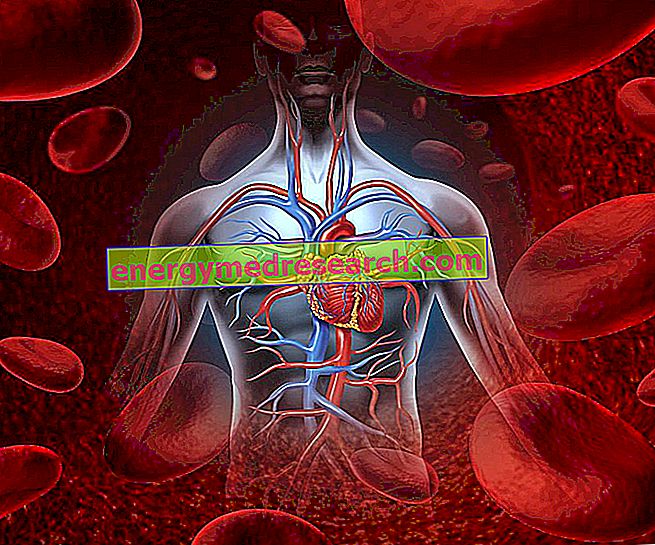Generality
Nervous gastritis is the particular form of gastritis that originates due to stress or anxiety.

Coming back to the list of psychosomatic illnesses, nervous gastritis is not a serious condition, but it is still very annoying, because it can deeply affect the patient's quality of life.
In most cases, nerve gastritis is due to stress or anxiety, which can result from: emotional problems with the partner, too hectic work activity, discomfort due to the presence of a chronic illness, concerns about having to undergo delicate surgery, worries about the outcome of a medical examination, etc.
Nervous gastritis is responsible for some typical manifestations, which are: heartburn, poor digestion, loss of appetite and general malaise.
Usually diagnosed through physical examination and medical history, nerve gastritis involves, where possible, a therapy aimed at controlling / managing the stressful or anxiogenic factor that causes the condition in question.
Brief review of the term gastritis
In medicine, "gastritis" is the word that indicates inflammation of the inner wall of the stomach.
Also known as internal gastric mucosa, the inner wall of the stomach is the complex of cell layers deputed to:
- Production of acidic digestive juices, necessary for the digestive process;
- The secretion of the mucus intended to protect the stomach from the aforementioned acidic digestive juices;
- Gastrin hormone production.
| Cellular layers that make up the inner wall of the stomach | Features |
| Epithelial layer | It is the most superficial layer (therefore in direct contact with the lumen of the stomach). It secretes the protective mucus. |
| Lamina propria | It is the middle layer. It has a dense network of glands, responsible for the production of acidic digestive juices. |
| Muscolaris mucosae | It is the innermost layer. It contains muscle cells, which guarantee the stomach the ability to move food towards the intestine and proceed with the digestive process. |
What is Nervous Gastritis?
Nervous gastritis, or stress gastritis, is the particular inflammation of the inner wall of the stomach which causes intense stress or states of very severe anxiety.
In other words, nerve gastritis is the form of gastritis that can affect those who experience moments of great stress or emotions or those who are victims of very trying anxiety attacks.
It is a Psychosomatic Disease
Nervous gastritis is an example of a psychosomatic illness (or psychosomatic disorder ).
In medicine, all those pathologies of the body take the name of somatic diseases (somatic means precisely "of the body") whose causes have a psychological nature; in a sense, with the occurrence of a psychosomatic illness, it is as if the patient translated a disturbance of the mind into a physical manifestation.
The cause of a psychosomatic illness can be intense stress due to a hectic life or anxiety caused by feelings such as anger, depression and so on.
Causes
Fundamental premise to understand: the episodes of gastritis are the result of the irritating and corrosive action, made by the digestive acid juices of the stomach against the internal gastric mucosa, when their production exceeds the real demands (high gastric acidity) or when the aforesaid mucosa has weakened following a certain circumstance (eg: abuse of alcohol).
It is not clear how stress and anxiety intervene in causing nervous gastritis; according to reliable studies, however, it seems that these two factors, when they are very intense, involve an increase in the production of acid digestive juices from the stomach and, consequently, the corrosion of the internal gastric mucosa.
In other words, it seems that stress and anxiety cause nerve gastritis, because they induce excessive and consequently damaging release of the digestive acid juices from the gastric cells responsible.
What stressful situations are associated with Nervous Gastritis?
Usually, anxiety or stress is at the origin of nervous gastritis, which can derive from:
- Sentimental problems with the partner;

- Feelings of discouragement related to the presence of a chronic disease;
- A frenetic work activity or a job with an uncertain outcome;
- Concerns about the health of a loved one;
- Concerns about a delicate surgical operation, which the patient will have to undergo shortly;
- Concerns about the outcome of a medical examination, a school test or a job evaluation.
Who is at risk of Nervous Gastritis?
I am particularly at risk of suffering from nervous gastritis:
- People with a hectic job or whose results always include a sometimes unnerving waiting period;
- People who experience emotional difficulties with their partner;
- Individuals suffering from a chronic illness or who are about to undergo a delicate surgical operation;
- Individuals with a relative dear to them in serious health condition;
- Who is waiting to receive the outcome of an important clinical and scholastic / work examination.
Types of Nervous Gastritis
Nervous gastritis can be acute or chronic.
If it has an acute character, it is an example of acute gastritis, where by acute gastritis the doctors understand the inflammation of the abrupt and sudden appearance of the inner wall of the stomach, intense in terms of symptoms and limited duration.
If it is chronic, on the other hand, it is an example of chronic gastritis, where for chronic gastritis the experts understand the inflammation of the inner wall of the stomach with a gradual appearance, mild in terms of symptoms and lasting for several weeks.
The acute or chronic character of nerve gastritis depends, fundamentally, on the trigger for stress or the state of anxiety underlying the condition.
Symptoms and Complications
The typical symptoms and signs of nervous gastritis are:
- Heartburn . To highlight this symptom is a localized pain in the upper part of the abdomen ( epigastric pain ), whose intensity varies from patient to patient.
At the heart of heartburn is the noticeable increase in gastric acidity, resulting from the increased production of acid digestive juices from the stomach;
- Bad digestion (or indigestion ). Its presence is the result of the inevitable interference that inflammation produces towards the digestive process at the gastric level and the emptying of the stomach;
- Appetite decline . It is a very common disorder in the presence of nervous gastritis; sometimes, but only on very rare occasions, it can be associated with nausea and a sense of vomiting.
- General malaise and sense of " tightness to the stomach ". It is a consequence of heartburn, indigestion and stress or anxiety.
Complications
Episodes of non-nervous gastritis can lead to serious complications, such as peptic perforating ulcers with blood loss ( gastrointestinal haemorrhage ) and dehydration .
Fortunately, even when it is severe, nerve gastritis does not seem to have the same effects as non-nervous gastritis (eg NSAID gastritis or alcoholic beverages, etc.); however, it is still a condition worthy of attention, since, in the long run, it can profoundly affect the quality of life of the patient.
Diagnosis
Normally, a physical examination and medical history are sufficient to make the diagnosis of nervous gastritis.
Any recourse to more in-depth tests (eg: tests for the tracing of Helicobacter pylori, blood tests, stool tests, etc.) takes place in the presence of doubtful situations.
Importance of accurate history
The anamnesis is the critical study of symptoms, carried out in order to understand the cause or, at least, the most accredited one.
In a context of nervous gastritis, the anamnesis is very important, because it is on the causal factor that the therapy planning indicated for healing is based.
Importance of resorting to in-depth analysis in case of doubt
In doubtful cases, furthering diagnostic research is a must, because some forms of non-nervous gastritis can have very dangerous consequences, such as the aforementioned dehydration or the aforementioned formation of perforating peptic ulcers.
Usually, it is difficult to confuse nerve gastritis with non-nervous gastritis, since the latter is typically responsible for nausea, vomiting and a sense of weakness, 3 symptoms which are mostly absent when the gastritis is psychological.
Did you know that ...
In most cases, non-nervous gastritis recognizes Helicobacter pylori infections as a cause.
The forms of gastritis due to Helicobacter pylori require specific antibiotic treatment.
Therapy
The treatment of nervous gastritis is based on the management / control of the stressful or anxiogenic factor, which has generated the inflammatory condition present.
The feasibility of such management / control, however, is not always simple or possible; consider, for example, the management difficulties that can arise, when the cause of nervous gastritis is a chronic disease, for which there is no therapy (ie it is an incurable disease).
Some advices
An individual suffering from nervous gastritis can derive tangible benefits from:
- The practice of relaxing and anti-stress gymnastics, such as yoga ;

- Psychotherapy . There are forms of psychotherapy that help to manage the negative feelings responsible for stress or anxiety, so as to prevent their effects on the somatic level;
- The adoption of a dietary plan, which excludes fatty foods, fries and foods whose consumption is associated with an increase in gastric acidity, in favor of more vegetables, more low-fat foods, more fruit and more dishes dressed in a "lean" way ;
- The regular practice of physical exercise . Science has shown that regular exercise has positive effects on mood and is an effective stress reliever.
Prognosis
If the management of the causal factor is something feasible and effective, nerve gastritis is often associated with a benign prognosis.
Prevention
To prevent nerve gastritis, techniques for managing and controlling stress and anxiety are of great help.
Among the stress and anxiety management techniques indicated to prevent nervous gastritis, autogenic training deserves special mention.



